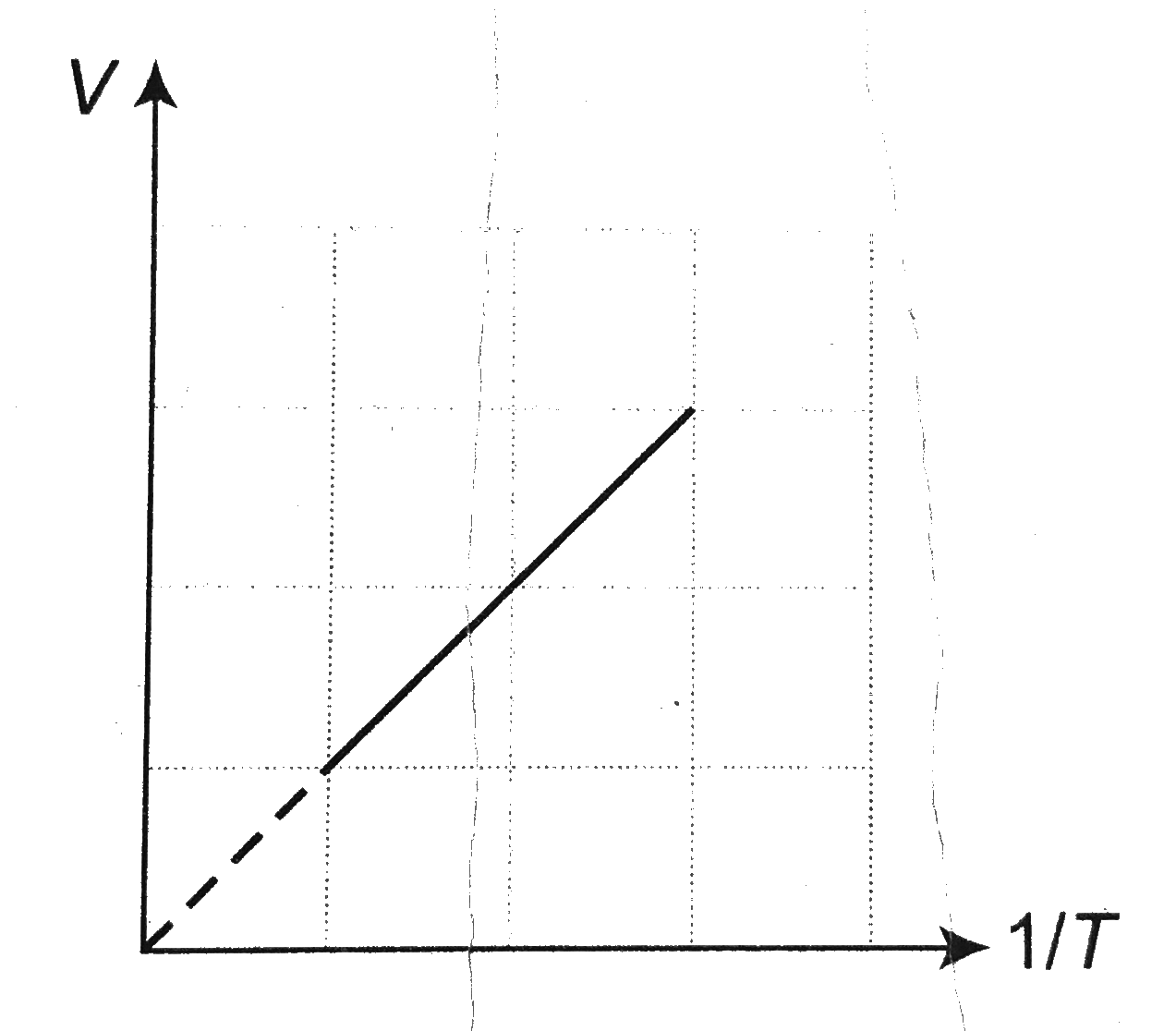An ideal monatomic gas undergoes a process where its pressure is inversely proportional to its temperature.
(a) Calculate the molar specific heat of the process.
(b) Find the work done by two moles of gas if the temperature change from T1 to T2.
The correct Answer is:A, B, D
To solve the problem step by step, we will address both parts of the question regarding the ideal monatomic gas.
Part (a): Calculate the molar specific heat of the process.
1. Understand the relationship between pressure and temperature:
Given that pressure P is inversely proportional to temperature T, we can express this as:
P∝1T⟹P⋅T=constant
2. Use the ideal gas equation:
The ideal gas equation is given by:
PV=nRT
Rearranging this gives:
T=PVnR
3. Combine the relationships:
From the relationship P⋅T=constant and the ideal gas equation, we can derive that:
P2V=constant
4. Identify the type of process:
This indicates a polytropic process of the form:
PVx=constant
Here, we can identify x=12.
5. Calculate the molar specific heat:
The formula for molar specific heat in a polytropic process is:
C=Cv+R1−x
For a monatomic gas, Cv=3R2. Substituting x=12:
C=3R2+R1−12=3R2+2R=3R2+4R2=7R2
Answer for Part (a):
The molar specific heat of the process is:
C=7R2
---
Part (b): Find the work done by two moles of gas if the temperature changes from T1 to T2.
1. Use the first law of thermodynamics:
The first law states:
ΔU=Q−W
Rearranging gives:
W=Q−ΔU
2. Express heat Q:
The heat added to the system can be expressed as:
Q=nCΔT
where ΔT=T2−T1.
3. Express change in internal energy ΔU:
The change in internal energy for an ideal gas is given by:
ΔU=nCvΔT
4. Substitute into the work equation:
Substituting the expressions for Q and ΔU:
W=nCΔT−nCvΔT
Factoring out nΔT:
W=nΔT(C−Cv)
5. Substitute the values:
We already calculated C=7R2 and for a monatomic gas, Cv=3R2:
W=nΔT(7R2−3R2)=nΔT(4R2)=nΔT⋅2R
6. Calculate for n=2 moles:
Substituting n=2:
W=2⋅2R⋅(T2−T1)=4R(T2−T1)
Answer for Part (b):
The work done by two moles of gas is:
W=4R(T2−T1)
---
Given that pressure P is inversely proportional to temperature T, we can express this as:
P∝1T⟹P⋅T=constant
The ideal gas equation is given by:
PV=nRT
Rearranging this gives:
T=PVnR
From the relationship P⋅T=constant and the ideal gas equation, we can derive that:
P2V=constant
This indicates a polytropic process of the form:
PVx=constant
Here, we can identify x=12.
The formula for molar specific heat in a polytropic process is:
C=Cv+R1−x
For a monatomic gas, Cv=3R2. Substituting x=12:
C=3R2+R1−12=3R2+2R=3R2+4R2=7R2
The molar specific heat of the process is:
C=7R2
The first law states:
ΔU=Q−W
Rearranging gives:
W=Q−ΔU
The heat added to the system can be expressed as:
Q=nCΔT
where ΔT=T2−T1.
The change in internal energy for an ideal gas is given by:
ΔU=nCvΔT
Substituting the expressions for Q and ΔU:
W=nCΔT−nCvΔT
Factoring out nΔT:
W=nΔT(C−Cv)
We already calculated C=7R2 and for a monatomic gas, Cv=3R2:
W=nΔT(7R2−3R2)=nΔT(4R2)=nΔT⋅2R
Substituting n=2:
W=2⋅2R⋅(T2−T1)=4R(T2−T1)
The work done by two moles of gas is:
W=4R(T2−T1)
Topper's Solved these Questions
- BOOK - DC PANDEYCHAPTER - LAWS OF THERMODYNAMICSEXERCISE - Level 2 Passage II3videos
LAWS OF THERMODYNAMICS
- BOOK - DC PANDEYCHAPTER - LAWS OF MOTIONEXERCISE - Medical entrances gallery39videos
LAWS OF MOTION
- BOOK - DC PANDEYCHAPTER - MAGNETIC EFFECT OF CURRENT AND MAGNETISMEXERCISE - Integer type Questions10videos
MAGNETIC EFFECT OF CURRENT AND MAGNETISM
Similar Questions
An ideal diatomic gas undergoes a process in which the pressure is proportional to the volume. Calculate the molar specific heat capacity of the gas for the process.
View SolutionThe pressure of a gas during an adiabatic operation, is found to be proportional to the cube of its absolute temperature. Calculate the ratio of specific heats of the gas.
View Solution
Knowledge Check
- Question 1 - Select One
In a process the pressure of a gas is inversely proportional to the square of the volume. If temperature of the gas increases, then work done by the gas:
Ais positiveBis negativeCis zeroDmay be positive - Question 2 - Select One
One mole of diatomic ideal gas undergoing a process in which absolute temperature is directely proportional to cube of volume, then, heat capacity of process is :
A103RB116RC176RD3R - Question 3 - Select One
In a process, the pressure of an ideal gas is proportional to square of the volume of the gas. If the temperature of the gas increases in this process, then work done by this gas
A(a) is positiveB(b) is negativeC(c) is zeroD(d) may be positive or negative
One mole of an ideal gas whose adiabatic axponent equal γ undergoes a process in which the gas pressure relates to the temperature as p=aTα, where a and α are consists. Find :
(a) the work performed by the gas if its temperature gets an increment ΔT ,
(b) the molar heat capacity of the gas in the process , at what value of α will the heat capacity be negative ?View SolutionOne mole of an ideal monoatomic gas undergoes the process T=T0+4V, where T0 is initial temperature. Find
(i) Heat capacity of gas as function of its volume.
(ii) The amount of heat transferred to gas if its volume increases from V0 to 4V0.View Solution"600J" of heat is added to a monatomic gas in a process in which the gas performs a work of "150J" .The molar specific heat capacity of the gas for the process is
View SolutionOne mole of an ideal monoatomic gas undergoes a process as shown in the figure. Find the molar specific heat of the gas in the process.

R is a gas constant.View Solutionn moles of an ideal gas undergo a process in which the temperature changes with volume as T=kv2. The work done by the gas as the temperature changes from 70 to 470 is
View Solution

